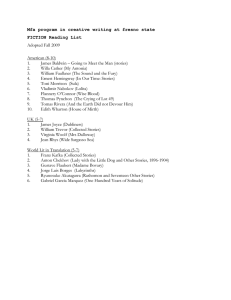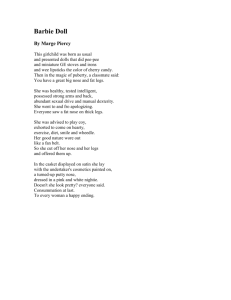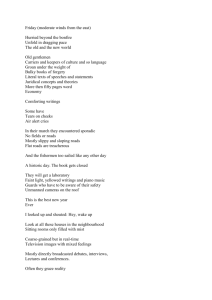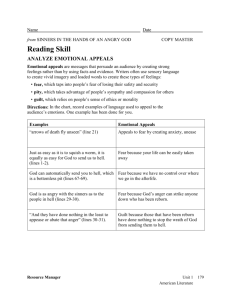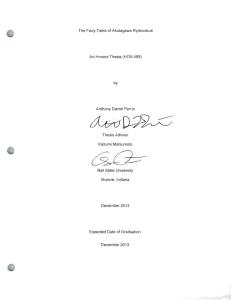Ryonosuke Akutagawa
advertisement
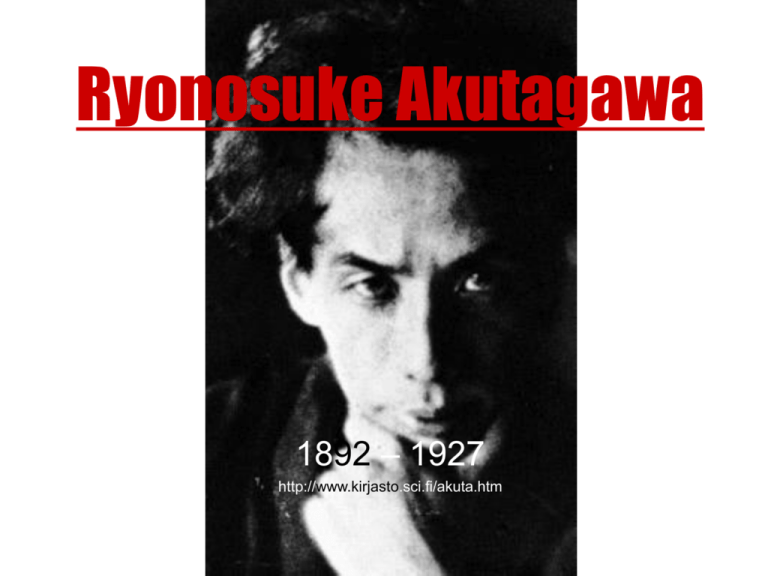
Ryonosuke Akutagawa 1892 – 1927 http://www.kirjasto.sci.fi/akuta.htm Early Life • Born in Tokyo, attended Tokyo Imperial University • His mother went insane • Founded Shin Shicho magazine Career • Taught at a naval school in Yokosuka and turned down teaching at the Tokyo and Kyoto Universities to continue to write freely, not under a curriculum • As a skilled linguist, he translated the works of Strindberg, Mérimée, Nietzsche, Dostoevsky, Baudelaire, and Tolstoy into Japanese • His early works took place in ancient Japan, but most of his works were set in the 1700’s and 1800’s. Only a few of his writings were set in his present day, and even then they were not representative of his experiences at that time. • About 150 of his writings were made into films, most of them by Akira Kurosawa. His writings were not very successful as films. • Most of his writings featured characters with exciting lives, unlike his own, but were made to represent the outcomes of his own life. “The Nose” (Hana) • In “The Nose” (Hana), a character mutilates himself due because he thinks he is being judged for having a gargantuan nose. At the end of the story, he ends up shortening his nose to look normal and he becomes more of an outcast. As goofy as this author looks, his appearance was never a problem for him, which made it so easy for him to write and teach a lesson about a character that is uncertain about his morals and appearance. “Hell Screen” (Jigoku-hen) • In “Hell Screen” (Jigoku-hen), an artist is asked by an Imperial Lord to paint a portrait of hell. In doing so, the character paints of picture of his only daughter being burned alive, symbolizing that perversions such as painting hell itself could turn a man to become insane. This parallels what could have been Akutagawa’s own life if he had given up writing for his enjoyment and had accepted to teach at a higher university where he would have to stick to a regimented curriculum instead of his own work. “In A Grove” (Yabunonaka) • In “In a Grove” (Yabunonaka), a woman is raped and murdered. The main character is an innocent bystander that witnesses this crime and represents Akutagawa’s life. Nothing eventful ever happened to him. All he did was write his entire life and watch the events around him. The End • Akutagawa committed suicide at the age of 35 after becoming delusional with hallucinations. His mother went insane, so it was probably hereditary. Works Cited • Liukonnen, Preti. Akutagawa Ryunosuke (1892-1927). Ed. Petri Liukonnen. 2008. 22 May 2009 <http://www.kirjasto.sci.fi/akuta.htm>. • Holt, Rinehart, and Winston. Modern World Literature. Austin: Harcourt Brace & Company, 2008. 259-66.
